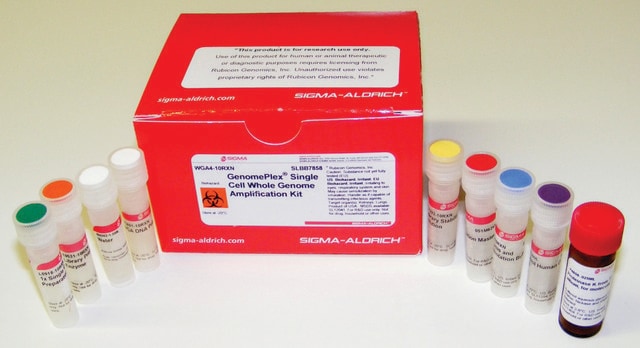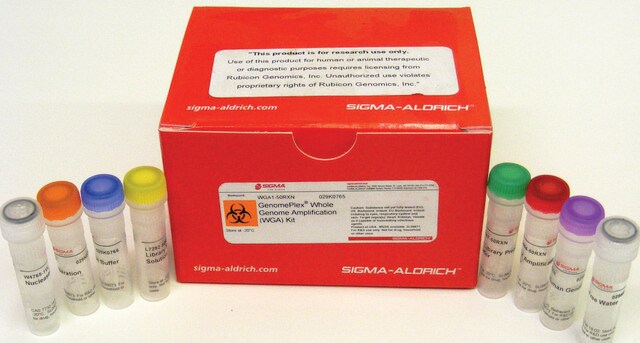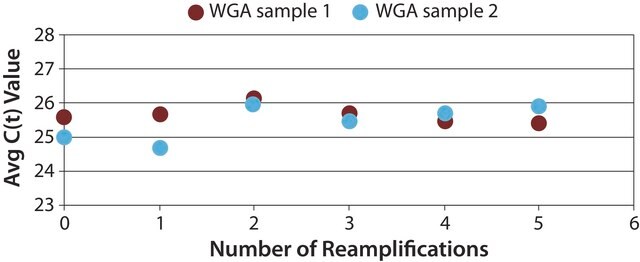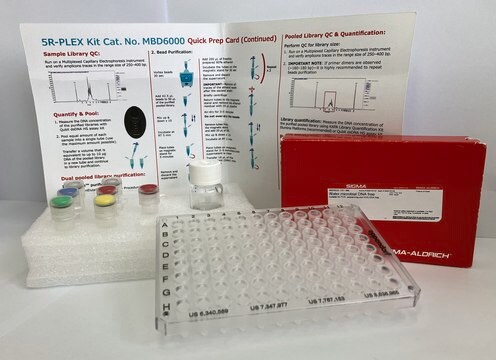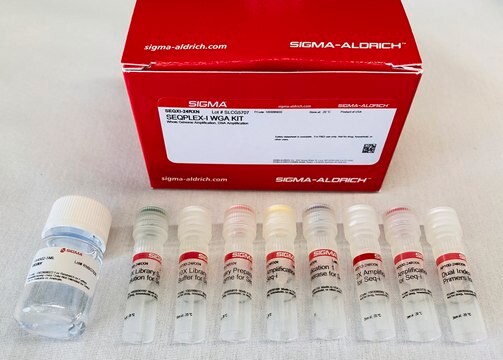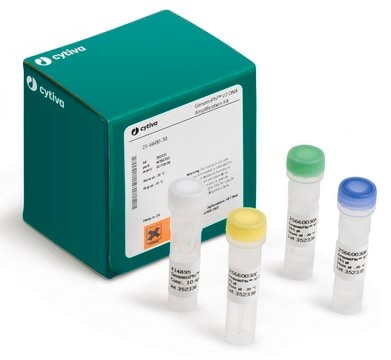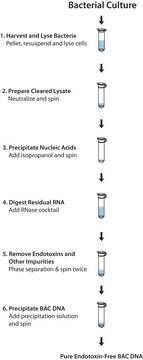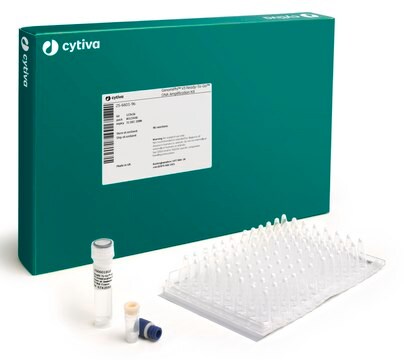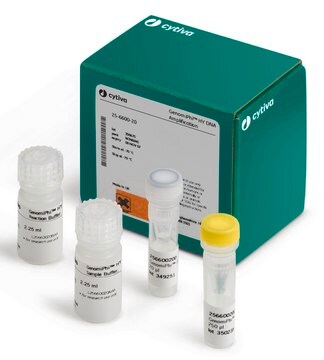Key Documents
WGA2
GenomePlex® Complete Whole Genome Amplification (WGA) Kit
Optimized kit with enzyme for amplifying a variety of DNA including FFPE tissue
Synonim(y):
Whole genome amplification kit
About This Item
Polecane produkty
Poziom jakości
metody
whole genome amplification: suitable
Warunki transportu
wet ice
temp. przechowywania
−20°C
Powiązane kategorie
Opis ogólny
Zastosowanie
- microarray analysis
- SNP analysis
- STR analysis
- DNA archiving
Cechy i korzyści
- Higher yield from minimal template: Amplification of nanogram amounts of genomic DNA to microgram yields (around 10 μg) in less than about three hoursrs
- Nanograms of samples can be preserved at –20 °C for future use
- Choose from a variety of DNA sources: whole blood, buccal swab, blood card, plant, soil, & formalin-fixed paraffin-embedded tissue (FFPE)
- Whole-genome amplification (WGA) DNA polymerase increases the amplification accuracy
- Whole-genome representation with no detectable allele bias
- Compatible with many downstream applications such as TaqMan® assays, single nucleotide polymorphism (SNP) analysis, comparative genomic hybridization (CGH) analysis
Inne uwagi
Informacje prawne
Elementy zestawu są też dostępne oddzielnie
- W4502Water, Nuclease-Free Water, for Molecular BiologyKarta charakterystyki
produkt powiązany
Hasło ostrzegawcze
Danger
Zwroty wskazujące rodzaj zagrożenia
Zwroty wskazujące środki ostrożności
Klasyfikacja zagrożeń
Resp. Sens. 1
Kod klasy składowania
12 - Non Combustible Liquids
Temperatura zapłonu (°F)
Not applicable
Temperatura zapłonu (°C)
Not applicable
Certyfikaty analizy (CoA)
Poszukaj Certyfikaty analizy (CoA), wpisując numer partii/serii produktów. Numery serii i partii można znaleźć na etykiecie produktu po słowach „seria” lub „partia”.
Masz już ten produkt?
Dokumenty związane z niedawno zakupionymi produktami zostały zamieszczone w Bibliotece dokumentów.
Klienci oglądali również te produkty
Produkty
In recent years, array-based Comparative Genomic Hybridization (aCGH) has been refined to determine chromosomal changes at progressively higher resolutions. This evolving technology is, however, hampered by the large DNA input requirement—a minimum of 150,000 copies of a human genome, or 0.5 μg, are generally needed per sample to rocess one CGH array.
In recent years, array-based Comparative Genomic Hybridization (aCGH) has been refined to determine chromosomal changes at progressively higher resolutions. This evolving technology is, however, somewhat hampered by the large DNA input requirement—a minimum of 150,000 copies of a human genome, or 0.5 μg, are generally needed per sample to process one CGH array.
Technologia aCGH usprawnia analizę chromosomów, wymagając znacznego wkładu DNA na próbkę.
The assessment of DNA quality is a crucial first step in acquiring meaningful data from formalin-fixed paraffin-embedded (FFPE) tissues, and other sources of damaged DNA. Using intact genomic DNA is key for successful analysis of chromosomal aberrations (e.g. SNP analysis, LOH, aCGH, etc.).
Protokoły
Genomic DNA from soil samples can be easily damaged by nucleases and contaminating debris resulting in low DNA yields. As a result, the researcher’s ability to perform downstream analysis may be compromised. After isolating DNA from the soil sample, the GenomePlex® Whole Genome Amplification Protocol is followed
Amplifikacja GenomePlex® poprawia wydajność DNA z próbek gleby, zapewniając niezawodność dalszej analizy pomimo potencjalnych uszkodzeń nukleazy.
Whole genome amplification (WGA) of plasma and serum DNA presents a unique challenge due to the small amount of nucleic acid in such samples.
This protocol provides a simple and convenient method to isolate, amplify and purify genomic DNA from saliva
Powiązane treści
GenomePlex® Whole Genome Amplification is the method of extracting DNA from the animal sample. GenomePlex® products have been used to amplify genomic DNA from chicken, porcine, bovine, fish, and shrimp source.
Nasz zespół naukowców ma doświadczenie we wszystkich obszarach badań, w tym w naukach przyrodniczych, materiałoznawstwie, syntezie chemicznej, chromatografii, analityce i wielu innych dziedzinach.
Skontaktuj się z zespołem ds. pomocy technicznej